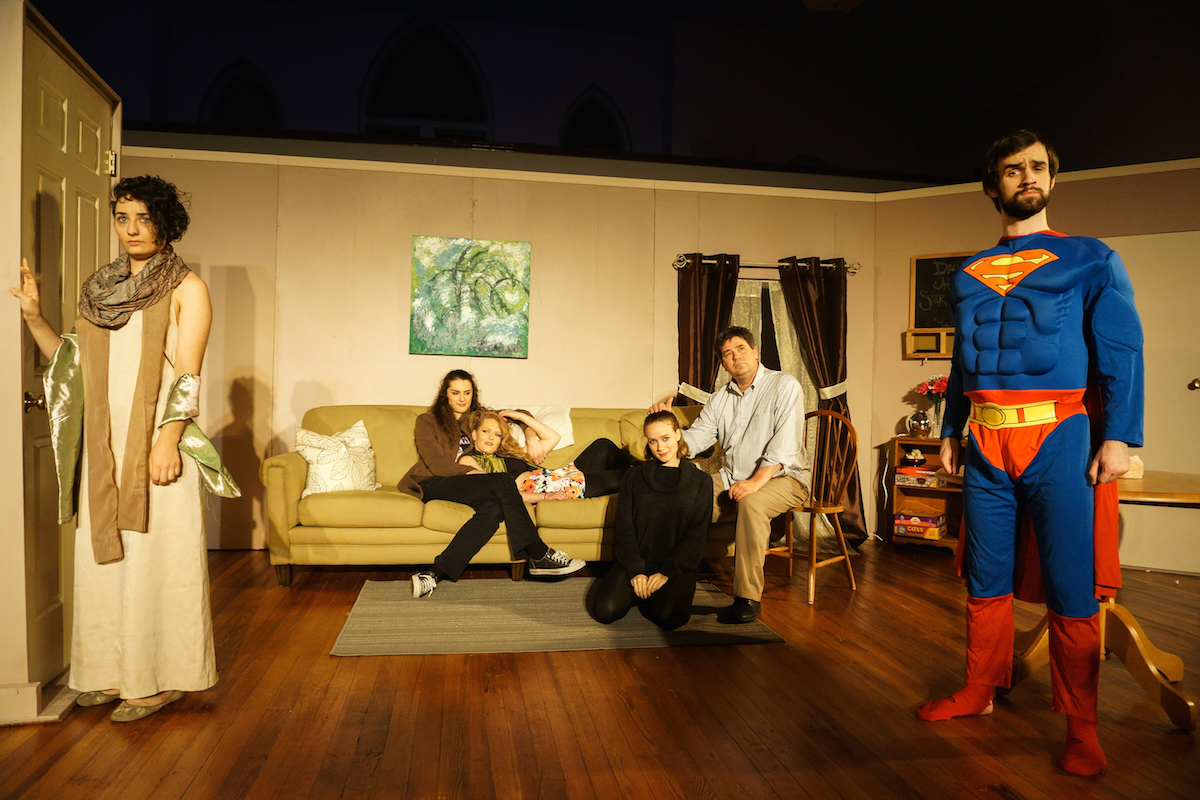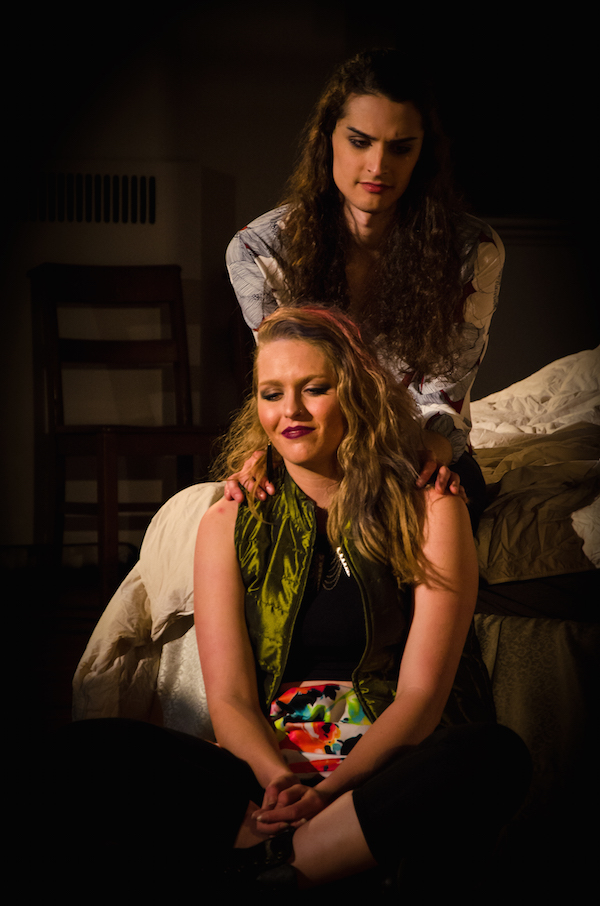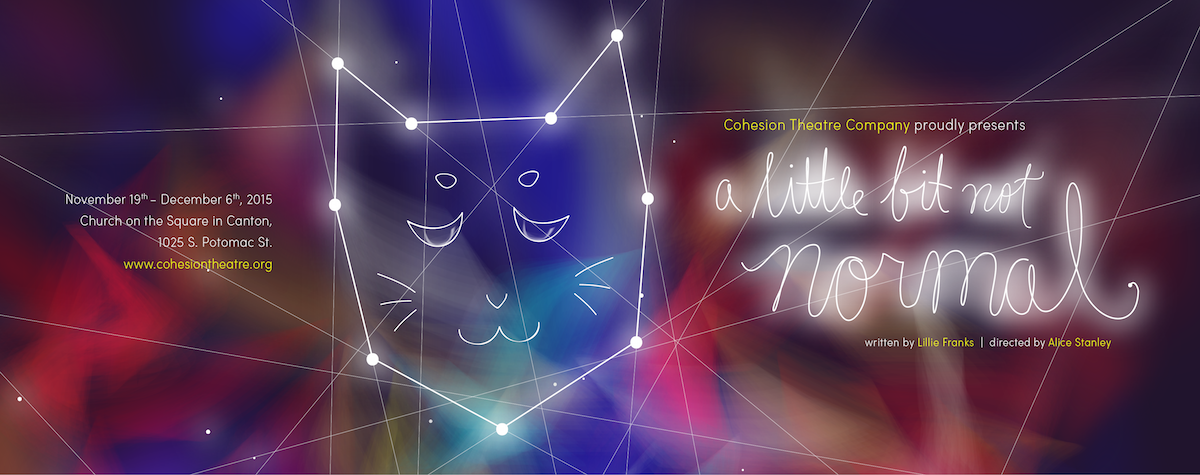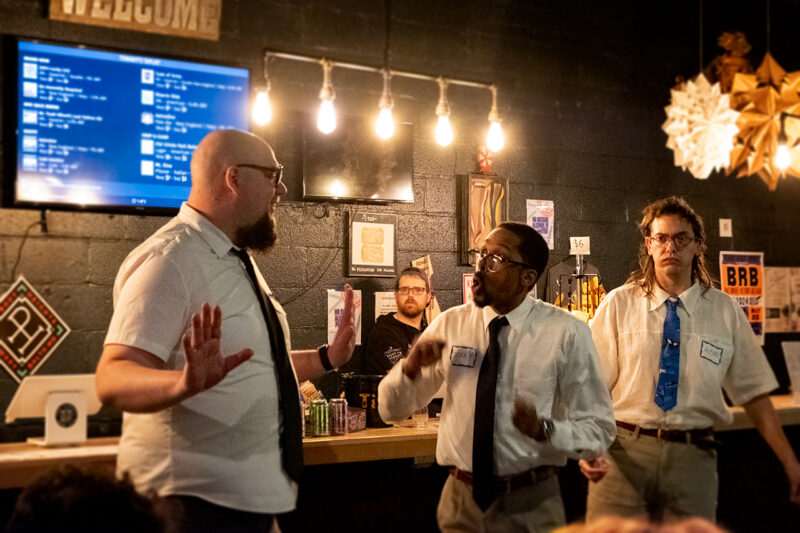A Little Bit Not Normal surreally and sincerely dives into a trans woman’s estranged relationship with her father
By Bret McCabe
Devon (Erica Burns) is having one of those weeks. Because her girlfriend Nancy (Casey Dutt) always seems to be running to and from battling werewolves and vampires, Devon spends her time chatting with her aloof cat Shadow (Martha Robichaud), who has just started dating someone new.
That Shadow’s partner happens to be God (Melanie Glickman) makes it a little awkward—especially when God’s estranged brother Supraman (Fred Fetcher-Jackson) shows up. He’s kind of an asshole and, yes, that’s supraman, “a similar but legally original form of the same Latin root.” To top it all off, Devon’s dad, Patrick (John Robin Wright), is coming to visit, the first time she’s seen him in five years—when she told her parents that she was transgender. They treated her like crap. Devon left.
Cohesion Theatre Company’s current world premier of Lillie Franks’ A Little Bit Not Normal is a engaging combination of everyday intelligence and profoundly deadpan subtlety. On the surface it’s practically an after-school special story of acceptance in young adulthood—you know, those wonder years of growing pains, when we learn about the facts of life though family ties, friendships with freaks and geeks, or any other overwhelmingly white, middle-class, cisgender, and heteronormative TV sitcom/drama that comes to mind.
Playwright Franks’ sly stroke of genius here is to wrap that story—the one where Devon and her father try to come some understanding and rebuild their relationship—in silly ephemera like vampire hunter, cat-deity romances, comic-book adventures, etc. The outlandish plotlines could feel like the disposable Styrofoam packaging surrounding the main plot, but it’s all those absurdities that give Normal is touching poignancy. Being trans* in this play’s world—the word the play’s program uses to denote a broader gender identity spectrum—is ordinary and normal. It’s everything else in which Devon lives that is, at times, completely off its rocker.
Credit to director Alice Stanley and scenic designer Dutt for allowing the play’s setting and tone to define its ordinariness. Devon and Nancy’s apartment is overwhelmingly decorated in neutral earth tones: brown curtains, a bed dressed in beige linens, beige walls, a beige-and-gold tablecloth over the beige-stained-wood dinette set, etc. (There’s really nothing that says everyday America quite like a sea of beige.) Throughout, director Stanley paces the script’s comic exchanges, which are often completely unafraid of puns, to the narrative beats of family-friendly prime-time TV dialog.
All of which allows the cast to dig into the play’s witty skewering of all things conventionally considered “normal.” Franks’ writing has a touch of Holly Hughes’ extravagant intelligence, that impish ability not only to combine high and low culture but to give the mainstream status quo enough rope to hang itself. Glickman’s urbane, droll, and mildly neurotic God feels like she could be a character in The Thin Man film series, a brassy mix of common sense and chutzpah.
Fetcher-Jackson’s Supraman is a bumbling, slapstick invention, less super hero than common fool. Nancy is the most-est best-est BFF-slash-girlfriend ever all rolled into one vampire-slaying heroine, looking like she only buys her clothes at a Contempo Casuals where it is always 1986. (Also: Dutt does amazing stage eye-roll.) Robichaud’s Shadow is the most ludicrous invention of the bunch. One moment she seems like she’s parodying Arnold Schwarzenegger’s Conan the Barbarian (Shadow tells Devon her real name is, “Anadias, whose mouth runs red with the blood of enemies”); the next she’s comically seeking Devon’s hand to rub her face.
Such silliness can seem like distraction—indeed, some of the play’s jokes pass completely without comment: When God comes over for dinner with Shadow and Devon, Shadow gets a can of cat food while God is served a single loaf of bread, a fish, and a glass of wine. But the scenarios in which Franks puts them, and the words they say sneakily address how everyday culture and institutions manufacture and sustain conventional standards of normalcy.
The play itself doesn’t make too big of a deal over the fact that God is a woman. Typical religious no-nos are comically treated, and God’s responses are so antithetical to the biblical norm it quietly highlights how much religion shapes interpersonal punitive responses. When Devon uses g-d’s name in vain she appears, modestly admonishing, “Not to be picky on this one, but you know, I did kind of ask people not to do that. I get really confused about whether I should be answering or not.” Similarly, Fetcher-Jackson’s vaudevillian Supraman spotlights how narrowly the comic-book Superman defines masculinity, as a Christ-like figure who solves problems though displays of force—or, as Supraman says, with punching.
All these little (his)stories construct the moral and emotional world that we inhabit; so does language, which Devon tries to explain to her father. Normal builds to a few scenes where Devon attempts to explain why she left five years ago, about how after 23 years of her life she learned a new way to understand herself. It’s a thoughtfully written and impressively subdued tête-à-tête between father and daughter that colloquially articulates how much the words we use to describe ourselves, and each other, can impact a human being’s place in the world—whether or not she feels seen, understood, and recognized as the person who defines her own reality.
It’s a touchingly clumsy and sincerely uncomfortable scene that Burns and Wright commendably underplay. In fact, Normal‘s over-the-top aspects allow Burns and Wright to make Devon and her father refreshingly mundane, lending their relationship’s tensions, conflicts, and misunderstanding the sting of life lived. Neither Devon or her father really reach a point where one completely understands the other, but Normal isn’t interested in such tidy codas.
A Little Bit Not Normal is a play about a trans woman staged by a trans* creative team—the playwright, director, and lead so identifying—and the first production in Cohesion’s season-long Trans Voices Workshop series, which includes an interpretation of Shakespeare’s Twelfth Night adapted/directed by Phil Vannoorbeeck in January and Cohesion co-founder and Normal director Stanley’s Aphorism on Gender in April. I am looking forward to what this series produces, as this production sets the bar pretty high.
Cohension Theatre presents A Little Bit Not Normal through Dec. 6 at the Church on the Square. Tickets.
Author Bret McCabe is a haphazard tweeter, epic-fail blogger, and a Baltimore-based arts and culture writer.










